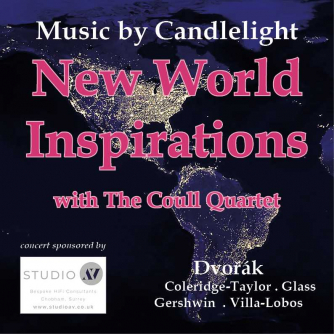Details
St Lawrence Church
High Street
Chobham
Surrey
GU24 8AA
England
Programme
Samuel Coleridge-Taylor – 5 Fantasiestücke, Op.5
Philip Glass – Quartet Satz
George Gershwin – Lullaby
Heitor Villa-Lobos – String Quartet no.1
~ Interval ~
Antonin Dvorak – String Quartet no.12 in F major 'American', Op.96
Performers
Coull Quartet
Other concerts in this Series (+)
Programme Note
Music by Candlelight is an established tradition at Chobham Festival, which this year takes an American turn with an expressive selection of music by composers inspired by, or who inspired America.
The Coull was formed in 1974 by students at the Royal Academy of Music under the guidance of renowned quartet leader, Sidney Griller, and rapidly achieved national recognition. The quartet, which includes two of its founder members, has performed and broadcast extensively throughout the UK, and in Western Europe, the Americas, Australia, China, India and the Far East.
Antonin Dvořák’s String Quartet 12 Op 96 was written during the composer’s years in America. Born near Prague, in what was then the Austrian Empire, now the Czech Republic, Dvořák came to the United States in 1892 to take up his three-year post as director of the National Conservatory in New York. He wrote this well-loved quartet during his first summer vacation, soon after he had completed the New World Symphony. While Dvořák loved America he also pined for his homeland and spent those weeks of the academic break in Spillville, Iowa, a small town of Bohemian émigrés.
A gifted lad from Croydon, Samuel Coleridge-Taylor was a major musical celebrity in the early 1900s in the United States as well as at home in Britain. The son of an English mother and a young doctor from Freetown, Sierra Leone, he had African-American heritage as a descendant of freed slaves. Dubbed patronisingly by white musicians in New York as “African Mahler”, Coleridge-Taylor was for African-Americans an inspiration. His music was widely performed in the US and on one of several visits he became the first black man to conduct a white orchestra. His following was such that he was invited to the White House by Theodore Roosevelt. Fantasie-Stucke – Fantasy Pieces – was one of his earliest chamber works.
Having celebrated his 85th birthday in 2022, Philip Glass can be said to be a grand old man of American music. His lyrical Quartet Satz is one of his most recent compositions, premiered in 2018.
With several pan-alley hit tunes already under his belt, the young George Gershwin wrote his delicate Lullaby as a student exercise in around 1919 while he was studying classical music theory with an Hungarian émigré, who introduced him to work by contemporary European composers, such as Debussy. Lullaby’s main theme became the opening of the aria in an unsuccessful Gershwin opera Blue Monday in 1922 but otherwise it was not publicly performed until the 1960s, long after the composer’s early death.
Brazilian composer, conductor, cellist, and classical guitarist Heitor Villa-Lobos is probably the best-known South American composer of all time, with music reflecting both European and Brazilian influences. His First Quartet was originally composed in 1915, under the title Suíte de Quartetos de Corda: Suíte Graciosa and in just three movements. In 1946, believing the original manuscript to have been lost, Villa-Lobos rewrote the score, adding three movements and retitling the work String Quartet No. 1.

 Your events at Classical Events
Your events at Classical Events

